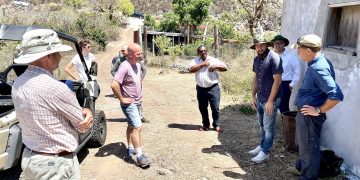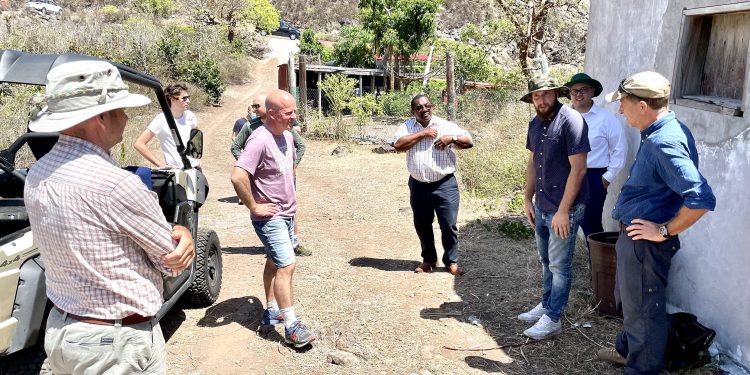SABA—Dutch caretaker State Secretary of Home Affairs and Kingdom Relations Raymond Knops expressed his full support for the goat control project during his visit to Saba on Tuesday, May 19. Saba’s ‘do mentality’ is visible in the execution of this project, he said. “On Saba, the attitude is: we have a problem, we make a plan and we execute it. That is an approach that appeals to me.”
On Tuesday morning, local goat control coordinator Justin Simmons – de Jong and his team took Knops on a visit to one of the local goat farmers on Saba. Present during this visit was Commissioner Rolando Wilson.
The farm, located at Kelby’s Ridge, is a shining example of how animals are to be kept in a fenced enclosure. The Public Entity Saba started its goat control project in July last year, to tackle the issue of free roaming goats. Earlier initiatives, such as the goat buy back program did not lead to durable results, which is why the local government in collaboration with the Ministry of Agriculture, Nature and Food Quality (LNV) launched the goat control project.
At Kelby’s Ridge, members of the project team, invasive species specialist Peter Haverson and Anne de Boer of the Ministry of LNV, provided background information about the project, the work that has already been done and the next phases that will follow.
Knops confirmed his support for the goat control project. “Goats are cute animals, but there are way too many of them. The free-roaming animals don’t contribuite to sustainable farming. Keeping goats is certainly possible, but it needs to be done according to the law, and that means they need to have eartags and they must be in pens. They need to get feed, and should not be allowed to eat the vegetation all over the island.” Knops said he saw it as a “sign of strength” when authorities decided to tackle a problem, and if needed, together with outside help.
During the visit to Kelby’s Ridge, the group talked about how the project fits in the Nature and Environment Policy Plan Caribben Netherlands 2020-2030. The Nature and Environment Policy Plan is about conserving and restoring the unique and important Nature of the Caribbean Netherlands islands. This plan is vital for the restoration of the coral reefs and combating erosion, but also for sustainable economic development. Nature is an important resource for the islands as it draws tourists and it provides opportunities for local food production.
Goats are not native to Saba but were introduced a long time ago, and while they are a part of the local culture, the environment needs to be protected from them. Free-roaming goats are key contributors to erosion, and have a large impact on the island’s biodiversity. There are several local laws that prohibit free-roaming goats.
With goats kept in a responsible manner, Saba’s residents will have the opportunity to start their own home gardens. In addition, the island’s natural vegetation will also have a chance to recover and regrow, which in turn has a positive impact on erosion. Saba has pristine nature, much of which is located in the Mt. Scenery National Park. The removal of goats in this protected area has started.


















